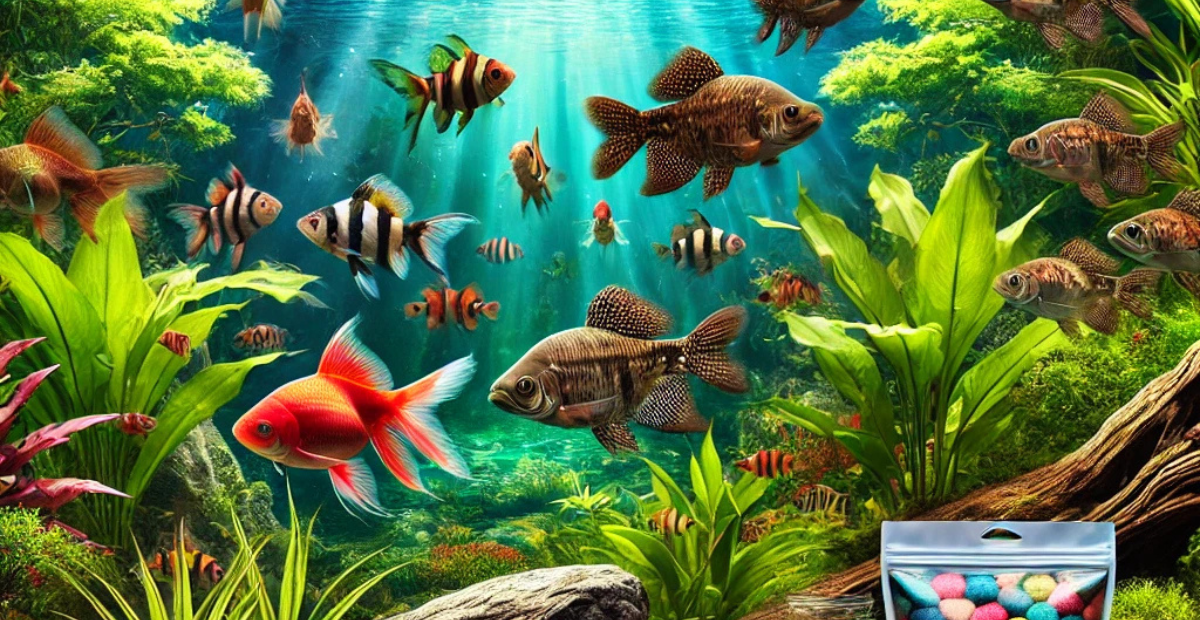A well-balanced diet is essential for the health, longevity, and vibrancy of freshwater fish. Proper nutrition not only enhances their immune system but also ensures healthy growth, bright coloration, and overall vitality. Whether you’re a beginner aquarist or an experienced fish keeper, understanding the importance of freshwater fish food is key to maintaining a thriving aquatic environment.
Understanding Freshwater Fish Nutrition
Just like humans, fish require a diverse and nutrient-rich diet to stay healthy. Their nutritional needs vary depending on species, size, and habitat. Providing the best freshwater fish food ensures they get essential proteins, fats, vitamins, and minerals necessary for their development.
Key Nutrients Required by Freshwater Fish
- Protein: Essential for growth and tissue repair, proteins should be the primary component of a fish’s diet. Carnivorous fish require a higher protein intake compared to herbivorous species.
- Fats: Provide energy and support cell function. However, excessive fats can lead to obesity in fish.
- Carbohydrates: While not as crucial, carbohydrates are still a necessary energy source, primarily for omnivorous species.
- Vitamins and Minerals: Vitamins like A, C, D, and E support immune function, while minerals like calcium and phosphorus aid in bone development.
- Fiber: Helps in digestion, particularly for herbivorous fish.
Types of Freshwater Fish Food
Choosing the right fish food freshwater options is crucial to meet the dietary requirements of your fish. Below are some common types of food available:
1. Flakes and Pellets
These are the most popular types of freshwater fish food available in the market. They provide a balanced diet and are suitable for various species. Pellets are often preferred for larger fish, while flakes are ideal for smaller ones.
2. Live Food
Live food such as brine shrimp, bloodworms, and daphnia are excellent sources of protein and closely mimic a fish’s natural diet. They are particularly beneficial for carnivorous and omnivorous species.
3. Frozen and Freeze-Dried Food
Frozen and freeze-dried foods offer a nutritious alternative to live food while maintaining convenience. These include krill, tubifex worms, and mysis shrimp, all of which provide essential nutrients.
4. Vegetable-Based Diet
Herbivorous fish require a diet rich in plant matter. Spirulina, blanched vegetables, and algae wafers are great choices for fish that thrive on a plant-based diet.
5. Homemade Fish Food
For those who prefer a DIY approach, creating homemade freshwater fish food can be a great option. Ingredients like shrimp, vegetables, gelatin, and vitamin supplements can be blended to form a nutrient-rich meal.
Feeding Guidelines for Freshwater Fish
- Feed in small amounts: Overfeeding can lead to water contamination and health issues.
- Observe feeding habits: If fish leave uneaten food, reduce the portion size.
- Vary the diet: Mixing different food types ensures fish receive all necessary nutrients.
- Establish a feeding schedule: Most fish do well with 1-2 feedings per day, but research your species for specific needs.
Final Thoughts
Providing a balanced diet is crucial for maintaining a healthy and thriving aquarium. By understanding your fish’s dietary needs and offering a variety of freshwater fish food options, you can promote their well-being and longevity. Always choose the best freshwater fish food suited for your species and ensure proper feeding habits to maintain a clean and stable aquatic environment. With the right approach, your freshwater fish will flourish, displaying vibrant colors, strong immunity, and active behavior.
FAQs
1. What is the best freshwater fish food for my aquarium?
The best freshwater fish food depends on your fish species. Flakes and pellets are good general options, but adding live, frozen, or vegetable-based food ensures a well-balanced diet.
2. How often should I feed my fish?
Most freshwater fish should be fed once or twice a day. However, some species, like bottom feeders, may require specialized feeding schedules.
3. Can I give my fish human food?
While some blanched vegetables like zucchini or spinach can be beneficial, avoid giving processed human food as it may contain harmful additives.
4. What happens if I overfeed my fish?
Overfeeding can lead to obesity, poor water quality, and increased ammonia levels, which can harm your fish.
5. Is live food necessary for freshwater fish?
Live food isn’t mandatory, but it is highly beneficial, especially for carnivorous and omnivorous fish, as it provides essential proteins and stimulates natural hunting behaviors.
6. Can I mix different types of fish food?
Yes, mixing different types of fish food freshwater options ensures a balanced diet and prevents dietary deficiencies.
Also Read
- ► Tinnitus Cure in Pakistan – Effective Treatments and ASSR Hearing Test Price
- ► Aerosol Can Manufacturing in Pakistan Best Spray Paint Company
- ► Ultrasound Clinic in Noida: Your Trusted Medical Center for Reliable Diagnostics
- ► The Science Behind Incubator Machines: Everything You Need to Know
- ► Cable Price in Pakistan – High-Quality DC Solar Wires in Pakistan
- ► HIFU: A Revolutionary Anti-Aging Skin Treatment
- ► Pest Control and the Best Bed Bug Treatment for a Pest-Free Home
- ► Best Water Pump in Pakistan with HECO Motors
- ► Pest and Bed Bug Treatment Services for a Pest-Free Home
- ► Anti Social Social Club: The Ultimate Streetwear Phenomenon
- ► Trinkwasser Spender: Der einfache Weg zu gesundem Wasser im Alltag
- ► The Ultimate Guide to Straight Wigs: Styles, Care, and More
- ► What’s going on with the Indian School System?
- ► Top 11 a success enterprise ideas to start from Indian Villages & Smaller towns
- ► Figuring out the Science behind RO Innovation





